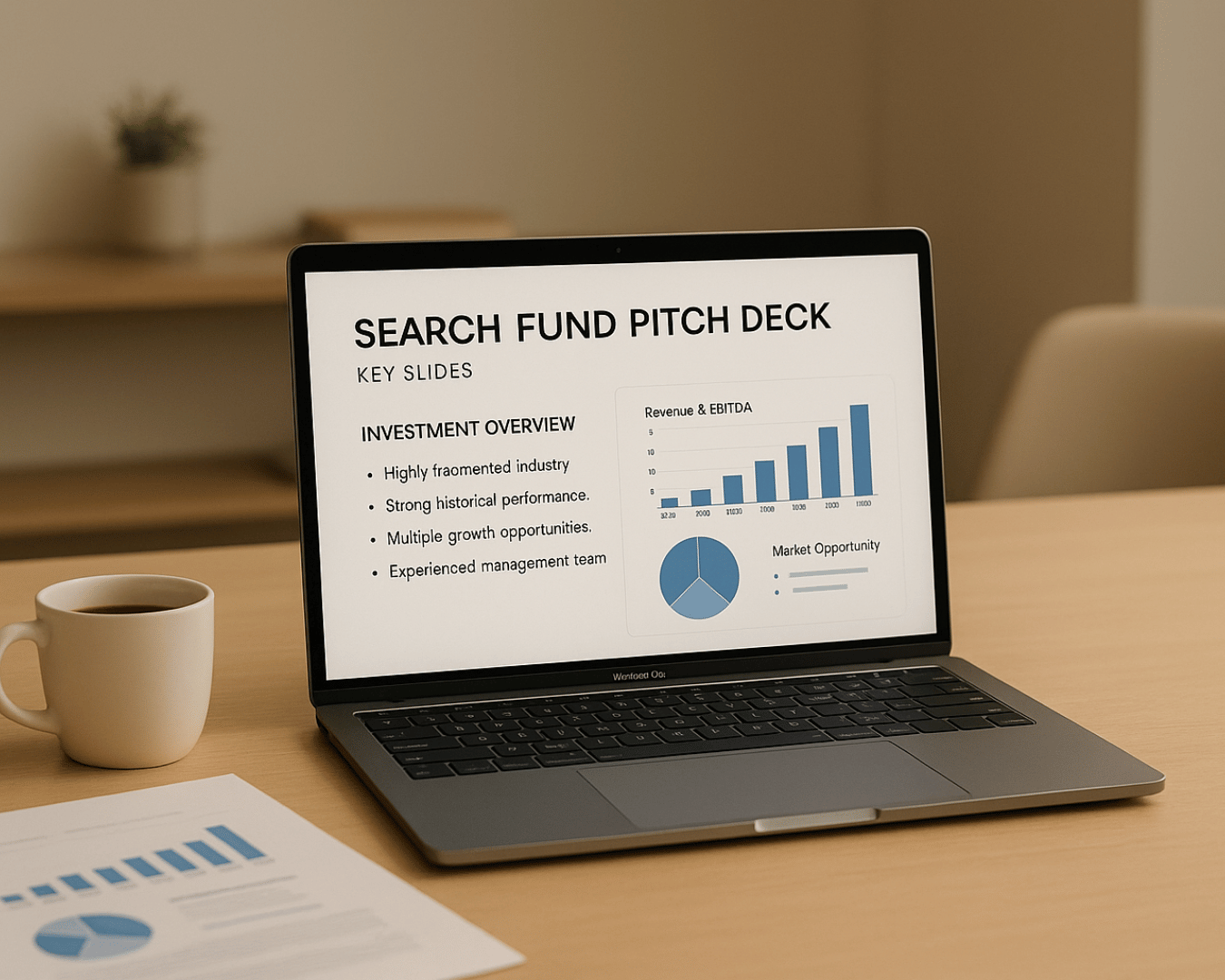Hiring the right business broker is critical to ensuring a smooth and successful transaction when selling or buying a business. A skilled broker can help you secure the best deal, maintain confidentiality, and navigate the complexities of the process. However, choosing the wrong broker can lead to undervaluation, wasted time, or even failed deals.
Here are the key questions to ask before hiring a broker:
- Experience: Do they specialize in businesses like yours?
- Certifications: Are they licensed and professionally certified?
- Success Rate: What percentage of deals do they close, and how do they define success?
- Valuation Approach: How do they determine your business's value?
- Marketing Strategy: What methods do they use to find qualified buyers?
- Buyer Screening: How do they ensure buyers are serious and financially capable?
- Fees: What is their payment structure, and are there upfront costs?
- Due Diligence Support: How involved are they in the due diligence and closing process?
- Confidentiality: How do they protect sensitive information during the sale?
- Post-Sale Support: Do they assist with transition planning and training?
What Should I Ask A Business Broker Before I Hire Them?
What Is Your Experience with Businesses Like Mine?
When choosing a broker, their experience with businesses similar to yours can make a world of difference. A broker who understands your industry is better equipped to navigate its unique challenges, market trends, and buyer expectations. Without this expertise, there’s a risk your business could be undervalued during negotiations. Let’s break down how to assess their industry knowledge and track record.
Industry and Business Type Knowledge
Every industry comes with its own set of complexities, whether it’s operational quirks, regulatory requirements, or specific market demands. For instance, a broker familiar with restaurants might know the ins and outs of lease agreements, licensing, and compliance issues. On the other hand, brokers experienced with service-based businesses will likely prioritize factors like client retention and recurring revenue streams.
Ask for examples of similar businesses they’ve successfully sold. A good broker should be able to share details about recent transactions, the industry-specific hurdles they encountered, and how they positioned those businesses for success. Pay attention to the questions they ask about your business - thoughtful, informed inquiries are a strong sign of genuine expertise.
Track Record and Transaction Size
Beyond industry knowledge, a broker’s track record speaks volumes. Look into their history with transactions of a similar size and scope. Ask about the types of deals they’ve handled and how they navigated negotiations and the closing process. A trustworthy broker will openly share examples from their portfolio, highlighting their approach and results.
A clear history of successful transactions not only demonstrates their capability but also builds confidence in their ability to manage the unique challenges of selling your business.
What Certifications or Licenses Do You Hold?
When choosing a business broker, their certifications and licenses can speak volumes about their professionalism and ability to handle complex transactions. These credentials demonstrate their commitment to ethical practices and specialized training. Without proper licensing or certifications, a broker may lack the legal authority or expertise needed to manage your deal effectively.
License Requirements
Licensing rules for business brokers vary widely across the United States. In some states, a real estate license is required, while others have no such mandate. This patchwork of regulations underscores the importance of understanding the specific requirements in your state before proceeding.
Working with an unlicensed broker could lead to legal complications. To avoid this, ask directly:
"Are you licensed to operate as a business broker in my state, and how do state-specific requirements impact this transaction?"
A competent broker should readily provide proof of their licensing and explain how state regulations influence the sale process.
Licensing becomes even more critical if the transaction involves real estate. Many states require brokers handling property transactions to hold a real estate license, even when the primary focus is the business itself.
After confirming their licensing, take the next step by evaluating their professional affiliations.
Professional Memberships and Standards
In addition to basic licensing, a broker’s professional memberships can offer insight into their dedication to industry standards. Leading brokers often belong to organizations like the International Business Brokers Association (IBBA) or hold certifications like the Certified Business Intermediary (CBI) designation.
These memberships and certifications indicate a broker’s commitment to maintaining high ethical standards and staying up-to-date through ongoing training. Always ask for documentation of their licenses, certifications, and memberships. More importantly, have them explain how these qualifications will directly benefit your transaction.
Taking the time to verify these credentials is a critical step in ensuring the broker has the skills and integrity to guide your business sale to a successful outcome.
What Is Your Success Rate?
When assessing a broker, their track record can provide valuable insights into their abilities. However, determining a broker's "success rate" is tricky because of external factors that influence outcomes. There’s no universal formula for calculating this metric, which means brokers can interpret and present their numbers in ways that suit them. Instead of focusing on a single percentage, dig deeper into what lies behind those numbers.
Many businesses fail to sell for reasons outside a broker’s control, such as economic changes, unexpected business challenges, or decisions made by the owner. These variables don’t reflect the broker’s competence but can significantly affect their closing statistics.
To make a more informed judgment, focus on the broker’s approach. Ask about the factors that influence their closing rates. Look for brokers who employ a well-defined sales process, provide accurate data-driven valuations, actively market businesses beyond just listing them, maintain a network of pre-qualified buyers, offer regular updates, and engage in proactive negotiations.
Also, consider how selective they are with their clients. Brokers who carefully choose which businesses to represent often achieve better outcomes. They tend to work with clients who have realistic price expectations and businesses that are appealing to buyers. This selectivity can lead to higher success rates for the deals they take on.
Another aspect to evaluate is their fee structure. A performance-based fee, where the broker earns a commission only after closing the sale, signals confidence in their ability to deliver results. Brokers who are paid solely on commission are incentivized to overcome challenges and close the deal. By examining these elements, you’ll be better equipped to choose a broker who can navigate the complexities of the market effectively.
How Do You Determine the Value of a Business?
The way a broker approaches valuation can significantly impact the success of your business sale. A well-researched valuation not only attracts serious buyers but also sets the stage for realistic negotiations. By understanding how your broker determines value, you can better assess their expertise and grasp of the market.
Valuations should always be grounded in data and follow a structured process. Skilled brokers rely on a mix of methods and up-to-date information to arrive at a price that can stand up to scrutiny. This requires a deep understanding of your industry, current market trends, and the specific factors that drive value in your business.
The best brokers go beyond simply presenting a number. They take the time to explain their reasoning, guiding you through comparable sales, market trends, and the key aspects buyers will focus on during negotiations. This thoughtful approach blends traditional valuation techniques with modern tools for a more precise outcome.
Valuation Methods Explained
Brokers typically rely on three main valuation methods, each suited to different scenarios:
| Valuation Method | How It Works | Best Used For | Limitations |
|---|---|---|---|
| Asset-Based | Calculates the value of tangible and intangible assets minus liabilities | Ideal for asset-heavy businesses or liquidation situations | Overlooks earning potential and goodwill |
| Earnings-Based | Applies multiples to revenue, EBITDA, or cash flow | Best for profitable service businesses or established companies | Requires accurate and reliable financial records |
| Market Comparables | Analyzes recent sales of similar businesses | Works for most business types with available sales data | Limited by the availability of comparable sales data |
Each method has its strengths and is tailored to specific business types and situations. For profitable businesses, earnings-based valuations often give the clearest picture, while market comparables provide a buyer-focused perspective when adequate data is available.
Using Clearly Acquired's AI Valuation Tools
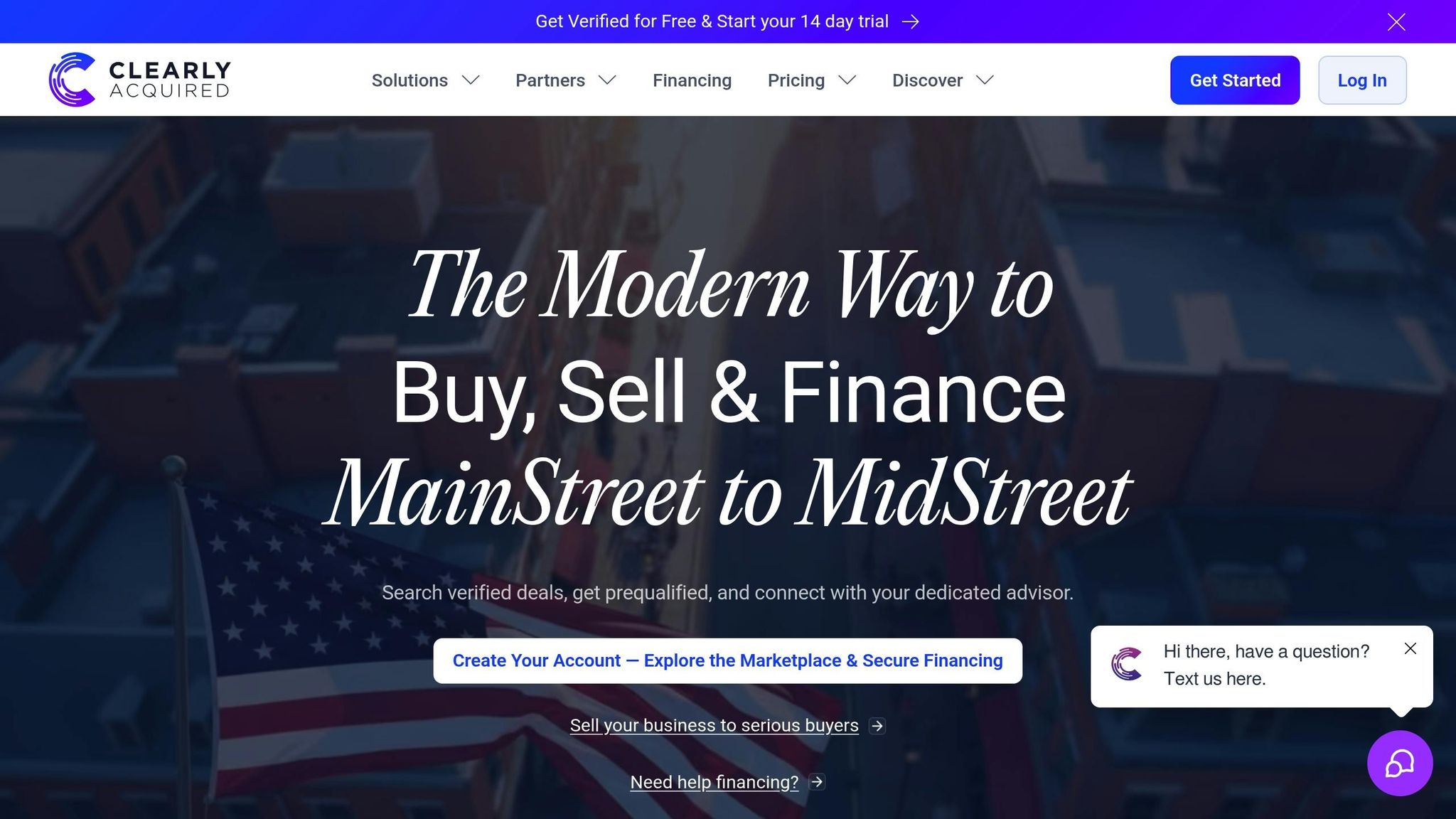
While traditional methods remain essential, advanced tools now enhance the accuracy of valuations. Clearly Acquired offers an AI-driven valuation platform that integrates financial statements, industry benchmarks, and comparable sales data to deliver a detailed valuation report.
This platform processes large volumes of market data quickly, identifying trends and comparable transactions that would take brokers weeks to analyze manually. It minimizes human bias and ensures consistent valuation practices across industries and business types.
For sellers, this means receiving a valuation that reflects current market realities and aligns with what similar businesses are selling for today. These tools complement a broker's expertise by providing robust data analysis to support strategic pricing decisions.
Brokers leveraging such technology can also offer ongoing valuation updates as market conditions shift. They can model various scenarios, showing how specific improvements to your business could influence its value and the timing of a sale. This combination of expertise and technology ensures sellers are equipped to make well-informed decisions.
What Methods Do You Use to Market and Find Buyers?
A broker’s strategy can make or break the speed and success of a sale. The goal is to strike the perfect balance between reaching the right audience and keeping the process confidential. This means ensuring that only qualified buyers get limited, non-identifying details about your business.
A solid marketing plan often involves using multiple channels to target different types of buyers while maintaining strict privacy standards. Some buyers check online listings, others rely on broker connections, and many are reached through direct outreach. A skilled broker uses a mix of these approaches, making sure confidentiality is prioritized at every step. This careful balance between exposure and discretion sets the stage for secure and successful transactions.
Marketing Channels and Privacy Protection
Professional brokers rely on a variety of channels to market businesses while safeguarding sensitive information. For example, online business-for-sale platforms often feature listings with confidential summaries - generalized descriptions that avoid revealing identifying details about your business.
Private broker networks and industry databases are another key resource. Brokers often collaborate with other professionals who represent qualified buyers, allowing for targeted outreach while protecting privacy through formal agreements.
Direct outreach is also a common tactic. In this approach, brokers contact potential buyers who have a specific interest in your industry or business model. This method is carefully managed to ensure that sensitive details don’t end up in the hands of casual browsers or competitors.
It’s worth noting that not all brokers operate with the same level of care. Be cautious of brokers who publicly share identifying details or fail to require non-disclosure agreements (NDAs) before releasing financial information. Similarly, working with a real estate agent who occasionally sells businesses could increase the risk of confidentiality breaches, especially if the associated real estate is listed separately.
Clearly Acquired builds on these traditional practices by integrating advanced digital tools to enhance confidentiality and streamline the process.
Clearly Acquired's Confidential Marketing Options
Clearly Acquired takes a tech-driven approach to marketing, combining wide-reaching exposure with strict privacy controls. Their platform offers both public and private listing options, allowing sellers to choose how much detail is shared. Blind profiles are carefully crafted to keep your business identity anonymous.
To ensure only serious buyers gain access to sensitive information, Clearly Acquired uses a verified buyer network. Prospective buyers must complete financial verification through Plaid and pass identity screening before accessing detailed business information. This process weeds out unqualified prospects while maintaining a large pool of legitimate buyers.
The platform also features secure data rooms, giving sellers control over which documents buyers can view during due diligence. Sellers can monitor all activity, reducing the risks tied to traditional document-sharing methods.
Additionally, tools like the Import Hub and email deal forwarding centralize marketing efforts while keeping confidentiality intact. Every potential buyer goes through a thorough screening process to ensure consistency and security.
Off-market search tools powered by Google Maps API allow brokers to identify and approach strategic buyers without publicly advertising the business. This means brokers can target buyers interested in specific industries or locations while keeping the business identity private until genuine interest is confirmed.
This technology-first approach ensures sellers reach a large pool of qualified buyers while minimizing the risks associated with traditional marketing methods. Brokers, in turn, can manage multiple listings and buyer relationships more efficiently using centralized tools and automation, creating a seamless and secure experience for everyone involved.
sbb-itb-a3ef7c1
How Do You Screen and Qualify Potential Buyers?
The success of a business sale often depends on how well you screen and qualify potential buyers. Proper screening not only saves time but also protects your sensitive business information. Without it, you could inadvertently share critical details with unqualified buyers, competitors, or casual browsers who have no real intention - or financial ability - to make a purchase.
A professional broker serves as your first layer of protection, weeding out unqualified prospects and safeguarding your confidentiality. They focus on identifying serious buyers who are both capable and motivated, ensuring your time and data are spent wisely.
As Lien De Pau, Founder of The Big Exit, puts it: "Not all buyers are serious or qualified. Some are just browsing, some can't afford your business, and some just want to spy on your financials."
Buyer Screening Process
Experienced brokers follow a structured process to confirm that potential buyers are both financially capable and genuinely interested in completing the transaction. This process begins well before any sensitive details are disclosed and continues throughout negotiations.
First, brokers assess the buyer's industry experience and strategic goals by asking targeted questions about their financial resources and interest in your business. This helps gauge whether the buyer is a good fit.
Financial verification is a critical step in the screening process. Buyers are typically required to provide proof of funds - such as bank statements or other asset documentation - to confirm they have the capital needed for the purchase.
To ensure legitimacy, brokers verify buyer identities through non-disclosure agreements (NDAs) and automated checks before sharing confidential information. This step helps protect your business from competitors or casual information seekers.
Detailed questionnaires further refine the process by evaluating the buyer's compatibility with your business. These forms cover aspects like the buyer’s timeline, management experience, growth plans, and motivations. This additional insight helps brokers determine if the buyer is likely to follow through successfully.
Advancements in technology have made this process even more efficient.
Automated Screening Tools
Modern tools, like those offered by Clearly Acquired, build on traditional methods to streamline buyer verification and enhance data security. These platforms reduce manual work while maintaining thorough and consistent screening.
For example, Clearly Acquired uses Plaid integration for financial verification. This system connects directly to buyers' bank accounts, providing real-time confirmation of liquid assets and ensuring they have the funds to proceed with the acquisition.
The platform also automates identity verification by deploying NDAs and running checks before granting access to sensitive information. Automated questionnaires collect details about buyers’ qualifications, experience, and acquisition criteria, flagging potential risks early in the process. Additionally, secure data rooms let sellers monitor which documents buyers access and for how long, offering valuable insights into their level of interest.
What Are Your Fees and Payment Terms?
Knowing how a broker charges for their services is crucial to avoid hidden costs and to ensure their goals align with yours. Business brokers use various pricing models, and the one they adopt can significantly influence your expenses and their motivation to close the deal.
A commission-based structure ties the broker's earnings directly to the success of your sale. In this setup, they only get paid if your business sells, which naturally aligns their interests with yours. On the other hand, some brokers charge upfront fees, retainers, or flat rates, which you must pay regardless of whether your business sells.
Comparing Fee Structures
Each fee model comes with its own level of risk and reward for both the seller and the broker. Here's a quick breakdown of the most common structures:
| Fee Type | Description | Payment Schedule | Seller Risk (if no sale) |
|---|---|---|---|
| Commission | Percentage of the final sale price | Upon successful closing of the sale | Low (broker is paid only if the sale happens) |
| Upfront Fees / Retainer | Fixed fee for services like valuation or marketing | Before or during the process | High (broker earns even if the business doesn't sell) |
| Success Fee | Paid only if the business is sold successfully | Upon closing of the sale | Low (payment tied to sale success) |
| Flat Fee / One-off Payment | Predetermined amount for broker services | Can be upfront, partial, or at closing | Depends on payment timing |
Commission rates are influenced by factors like the size and complexity of your business, as well as local market conditions. Meanwhile, upfront fees - often for tasks like valuations or marketing - mean the broker gets paid whether or not the sale goes through, which might reduce their motivation to secure the best deal for you.
A success fee operates similarly to a commission but may have distinct percentage rates or payment terms. Its biggest advantage? The broker only gets paid if they successfully sell your business.
Transparency in Costs
Clear communication about fees is essential to avoid surprises and to help you budget for the sale process. A trustworthy broker will outline all potential expenses, including their primary fee structure and any extra charges you might face.
Pay close attention to marketing costs. Some brokers include these in their commission, while others charge separately for services like professional photography, advertising, or listing syndication. It's also important to ask about legal and administrative fees - such as document preparation or contract reviews - and whether these are part of the standard package or billed separately.
Another factor to consider is due diligence support. Some brokers include help with buyer verification, organizing financial documents, and coordinating the closing process in their standard fees. Others might charge hourly rates for these services, which could increase your overall costs.
Be cautious with brokers who demand large upfront payments before proving their value. While a small retainer or marketing fee might be reasonable, significant upfront costs can be risky if the broker fails to deliver results. The most seller-friendly arrangements typically tie most of the broker's compensation to the successful completion of the sale.
Platforms like Clearly Acquired are known for their transparent fee structures, offering detailed cost breakdowns so you know exactly what you're paying for and when. Their success-based model ensures the broker's financial interests align with your goal of closing a profitable deal.
Take the time to weigh these fee structures carefully, especially in the context of the broker's role in due diligence and closing.
What Support Do You Provide During Due Diligence and Closing?
The due diligence and closing phases are some of the most critical moments in the process of selling a business. A skilled broker plays a vital role during these stages, offering hands-on support and guidance to help you navigate complex negotiations. Knowing exactly how your broker will assist during this time is essential to avoid last-minute surprises and ensure a smooth path to closing. The best brokers don’t just hand over paperwork and step back - they remain actively involved from the first buyer inquiry all the way to the final signatures, ensuring continuity and stability throughout the transaction.
Due Diligence Assistance
During due diligence, buyers dig deep into all aspects of your business, from financial records to customer contracts, looking for clarity and assurance. Your broker’s job is to help you prepare and present this information in a way that instills confidence while safeguarding your interests. This includes organizing financial statements, tax returns, customer lists, and operational records, ensuring they are complete, accurate, and easy to access.
A skilled broker also helps identify and address potential red flags before they become issues. For example, they can explain seasonal revenue patterns, one-off expenses, or unusual financial trends that might otherwise raise buyer concerns. Collaborating with your accountant and attorney ensures that your documentation is thorough and well-prepared.
Managing buyer communication is another critical role. Brokers act as a buffer, filtering and prioritizing buyer requests so you’re not overwhelmed with demands. They also keep the process moving by setting clear deadlines and addressing any issues that arise. If conflicts or challenges emerge, a broker’s negotiation skills can be the deciding factor in resolving them quickly and keeping the deal on track.
"Expert negotiation is one of the most critical skills a business broker brings to the table when you are ready to sell your business, as they champion your interests to achieve the most favorable terms possible."
– Sunbelt Atlanta
"Business brokers are adept at finding common ground and resolving potential conflicts, which is indispensable for ensuring a smooth and successful business transaction."
– Sunbelt Atlanta
Strong negotiation skills and the ability to resolve conflicts are often the difference between a successful sale and a deal that falls apart.
Clearly Acquired's Secure Data Rooms
In addition to document preparation, secure data-sharing platforms provide an extra layer of protection for sensitive information during due diligence. Clearly Acquired’s secure data rooms offer a centralized, protected environment where you can share confidential information with qualified buyers, maintaining full control over who can access what.
These data rooms allow you to categorize documents - such as financial records, legal paperwork, operational procedures, and customer information - making it easier for buyers to locate what they need. Features like automated document tracking let you see which files have been viewed and when, providing insight into buyer interest and priorities.
The platform’s secure sharing capabilities ensure sensitive details remain protected while fostering collaboration between your broker, attorney, and accountant. Everyone involved can upload, organize, and review documents in one shared space, reducing the risk of missed details. Since the data room integrates seamlessly with Clearly Acquired’s broader deal management tools, buyer communication systems, and transaction tracking features, it helps ensure that no crucial information slips through the cracks during closing.
When choosing a broker, be sure to ask about their document management systems and security measures. A well-organized and secure due diligence process can make all the difference in closing your sale on time and with confidence.
How Do You Protect Confidentiality and Secure Data?
When selling a business, safeguarding sensitive information is not just important - it's essential. Confidentiality breaches can lead to employee departures, give competitors an edge, and destabilize supplier relationships. That’s why understanding how your broker protects your data is critical to maintaining your business's value during the sale process.
Selling a business often takes months and involves sharing highly sensitive details like financial records, customer lists, operational data, and strategic plans with potential buyers. Without proper safeguards, this information could fall into the wrong hands, causing harm even if the sale doesn’t go through. Taking steps to ensure confidentiality from the very beginning sets the tone for secure data handling throughout the transaction.
Confidentiality Agreements and Practices
A professional broker should have strict protocols in place to ensure your information stays secure. One of the first steps is requiring all potential buyers to sign a non-disclosure agreement (NDA). Beyond this, brokers often implement a multi-step verification process, including questionnaires, identity verification, and proof of funds. These measures ensure that only serious and qualified buyers gain access to your sensitive data.
"Your broker should require potential buyers to sign a non-disclosure agreement (NDA), questionnaire, and verify they are a real person after they have properly vetted them and before revealing any company-specific marketing collateral." - MidStreet
Don’t hesitate to ask brokers about their confidentiality policies. They should be able to explain how they screen buyers, manage sensitive documents, and handle breaches if they occur.
"If information about the sale leaks out, it could prompt a mass exit of key employees from your company, hurting your bottom line and the sales price. Furthermore, your competitors might exploit the opportunity to gain a competitive advantage." - Raincatcher
Data Security Features
Legal agreements are just one layer of protection - technological safeguards are equally important. Advanced digital security tools can restrict access to sensitive documents and track every interaction with them, ensuring that only authorized individuals can view the information.
For example, Clearly Acquired’s platform incorporates robust data security features. Secure data rooms with permission-controlled access allow you to decide who can view specific documents and when. Additionally, an audit trail records every interaction, giving you full transparency over how your information is accessed.
Their platform also integrates with a deal management system, embedding confidentiality protections into every stage of the transaction - from initial buyer inquiries to finalizing the deal. This systematic approach reduces the risks associated with using disconnected tools or informal sharing methods.
When evaluating brokers, ask about their digital security infrastructure. Do they use encrypted file-sharing systems? Can they provide detailed access logs? Do they have clear protocols for document version control? A broker committed to data security will have well-defined answers and be able to explain how these measures protect your transaction.
What Support Do You Offer After the Sale?
A broker’s job doesn’t end when the deal is signed. Their role extends into the post-sale phase to ensure the transition is smooth and the business is set up for long-term success. A strong broker focuses on continuity from day one, helping the new owner hit the ground running.
Transition Planning and Owner Training
The handover period is critical to maintaining the value and stability of a business. Experienced brokers work on key transition elements, such as retaining essential employees, structuring seller financing to keep the previous owner engaged, or arranging for advisory support from the seller. As Baton Market highlights:
"An experienced business broker will take the time to understand your goals and work to ensure an optimal outcome." - Baton Market
Ongoing Advisory Services
Some brokers go a step further by offering advisory support during the transition. This guidance can be invaluable in helping new owners navigate early challenges. For instance, Acquira places a strong emphasis on creating seamless transitions. They explain:
"Acquira specializes in seamless business succession and acquisition. We guide entrepreneurs in acquiring businesses and investing in their growth and success. Our focus is on creating a lasting, positive impact for owners, employees, and the community through each transition." - Team Acquira
When considering brokers, it’s worth asking:
- What transition planning services do you offer to ensure a smooth handover?
- How do you support the new owner during the transition process?
This kind of post-sale support demonstrates a broker’s dedication to the long-term success of both the business and its new owner.
Conclusion
Choosing the right business broker can be the difference between a smooth transaction and a stressful ordeal. The ten essential questions discussed in this guide - from examining industry experience and certifications to understanding fee structures and post-sale support - offer a solid roadmap for evaluating potential brokers. These questions act as a filter, helping you pinpoint professionals with the skills, resources, and dedication needed to guide your deal to success. They also help you spot warning signs that might indicate a poor fit for your goals.
Taking the time to thoroughly vet brokers is crucial. A skilled broker brings valuable industry insights, access to established buyer networks, effective marketing strategies, and the expertise to handle complex negotiations - all while safeguarding your confidentiality. The impact of working with an experienced broker versus an inexperienced one can be substantial, often resulting in higher sale prices and faster transaction timelines.
The business brokerage field has seen notable changes, especially with the rise of technology. Tools like AI-driven valuation models, encrypted data sharing, and integrated deal management systems allow brokers to deliver more precise valuations, expand their marketing reach, and streamline the transaction process. When assessing brokers, consider how effectively they use these technological advancements to improve their services.
It’s important to remember that a lower fee doesn’t necessarily mean better value, and a higher fee doesn’t always guarantee expertise. Focus on finding a broker whose skills, strategy, and resources align with your specific needs and objectives. Investing time upfront to ask the right questions can make all the difference in ensuring a successful business sale or acquisition.
FAQs
What’s the best way to check a business broker’s credentials and track record before hiring them?
To assess a business broker’s qualifications, begin by checking their certifications. Look for credentials like the Certified Business Intermediary (CBI) designation or membership in respected organizations such as the International Business Brokers Association (IBBA). These certifications reflect a commitment to industry standards and continuous professional growth.
It’s also important to inquire about their experience in your industry, their track record, and examples of successful transactions. Don’t hesitate to ask for client references to better understand their professionalism and the results they’ve delivered. A reliable broker will openly share their background and provide the information you need to make a confident choice.
How can I protect my business's confidentiality during the sale process?
Maintaining privacy during the sale of your business is absolutely essential to prevent unnecessary disruptions with employees, customers, and even competitors. To ensure this, talk to your broker about how they handle sensitive information. Some of the most effective methods include having potential buyers sign a non-disclosure agreement (NDA), using confidential marketing tools like a confidential information memorandum (CIM), and carefully screening buyers to confirm they’re both serious and qualified.
Your broker should also have strategies to minimize the visibility of your business being on the market. For instance, avoiding public advertising that could reveal identifying details is a smart move. A skilled broker will have well-defined policies and processes to safeguard your privacy every step of the way.
How do advanced technology tools improve the business sale process and enhance a broker's services?
Advanced technology tools have become essential in transforming the business sale process into a more efficient and precise operation. These tools enable brokers to conduct in-depth business valuations through data analytics, tap into extensive databases of comparable sales, and design highly targeted marketing campaigns using digital platforms. Features like confidential online listings and multimedia presentations further help attract qualified buyers while keeping the process discreet.
On top of that, technology makes communication and document management much easier, cutting down on errors and speeding up timelines. This not only helps brokers secure better deal terms but also ensures a smoother and more polished transaction experience for everyone involved.


%20%20Process%2C%20Valuation%20%26%20Legal%20Checklist.png)



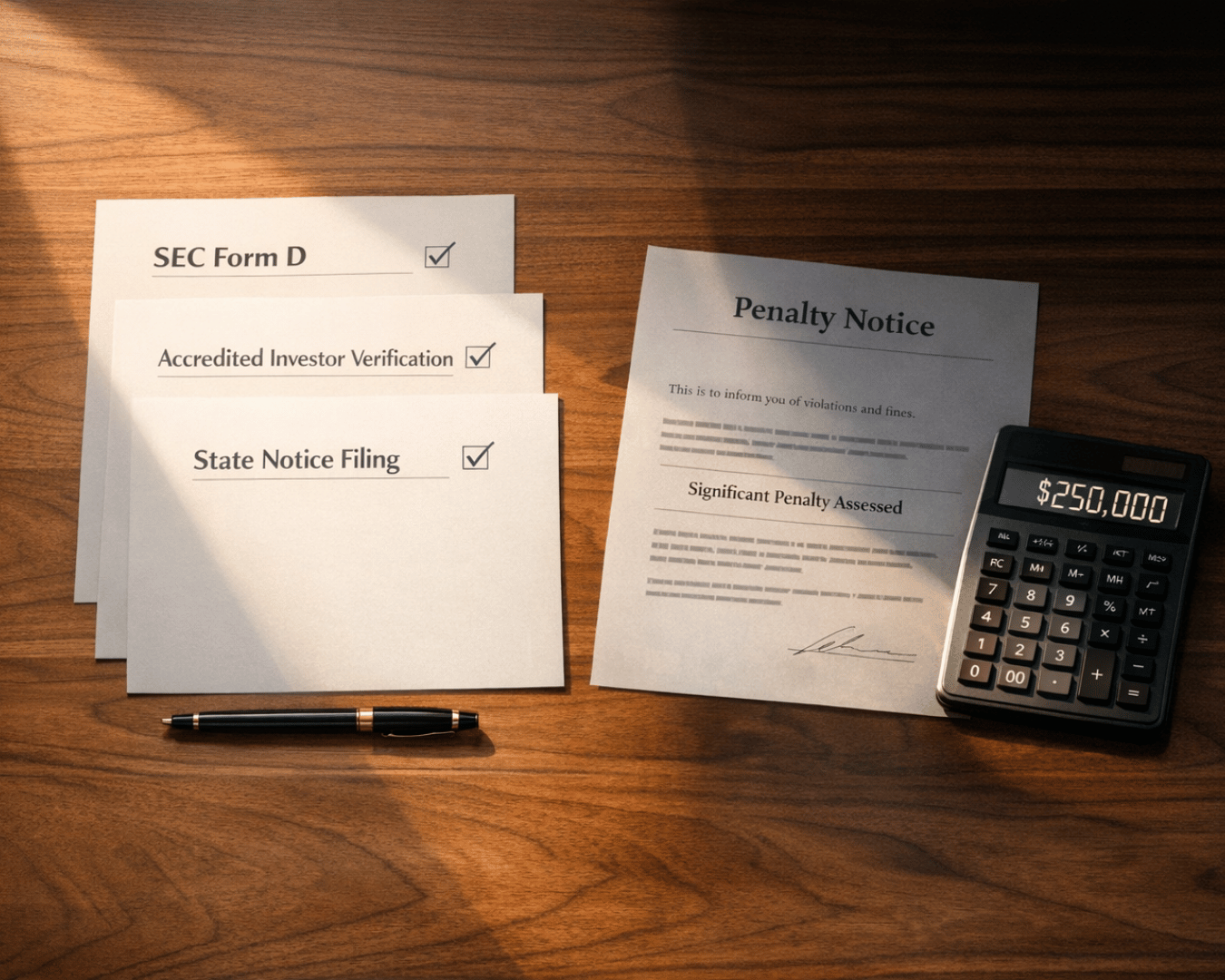







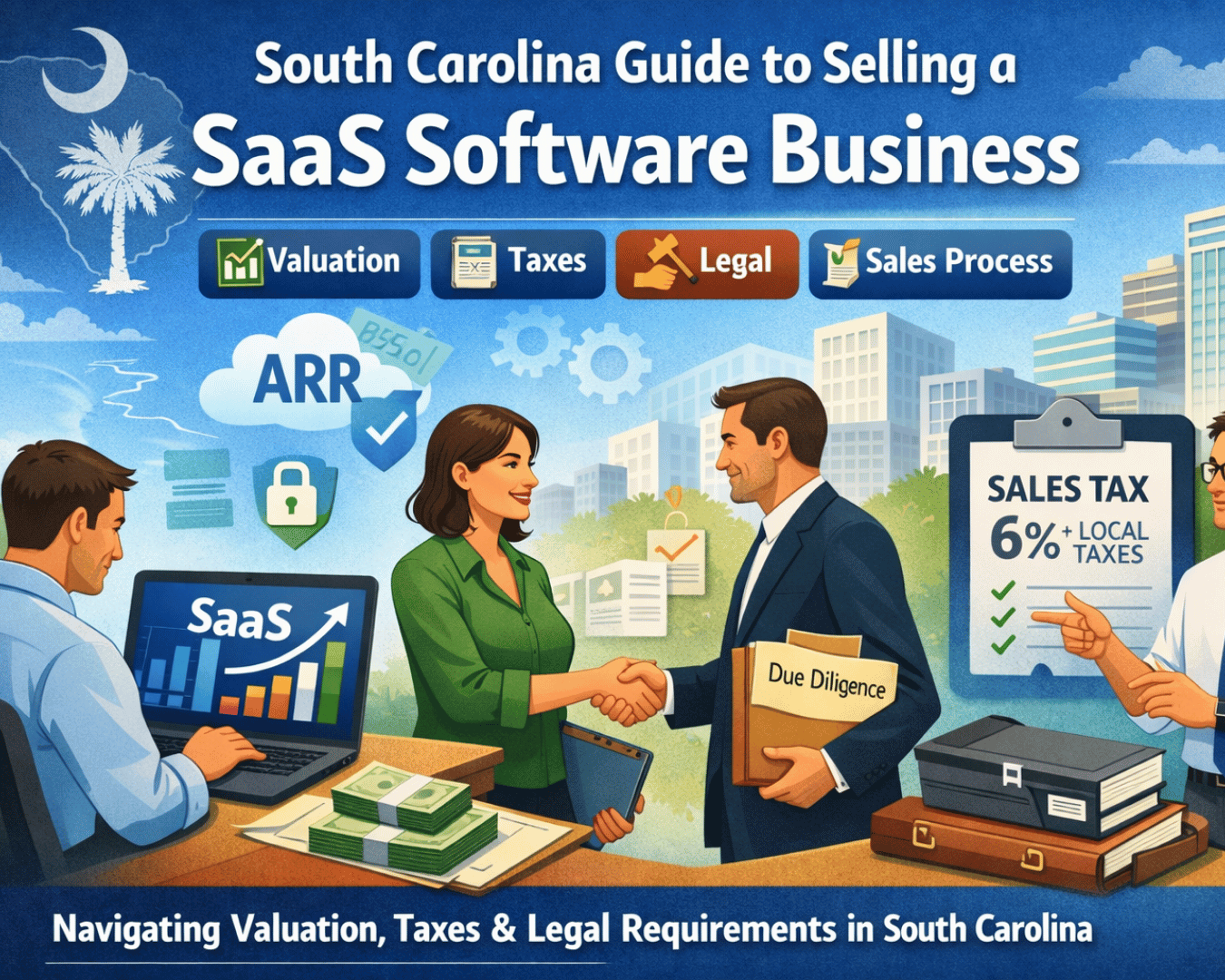







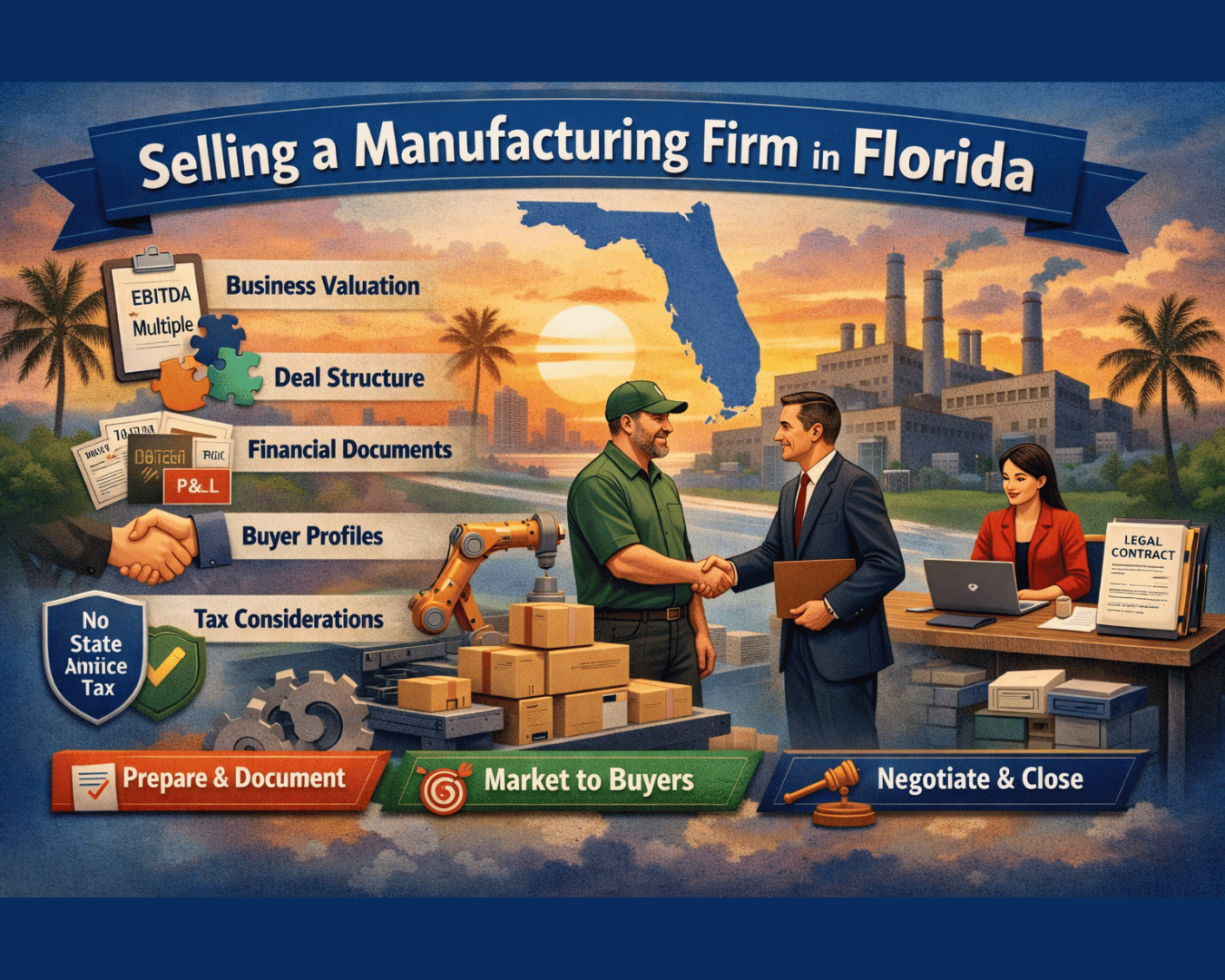
%20in%20a%20%2420M%20Sale..png)
%20vs.%20Conventional%20Loans%20for%20business%20acquisition.png)








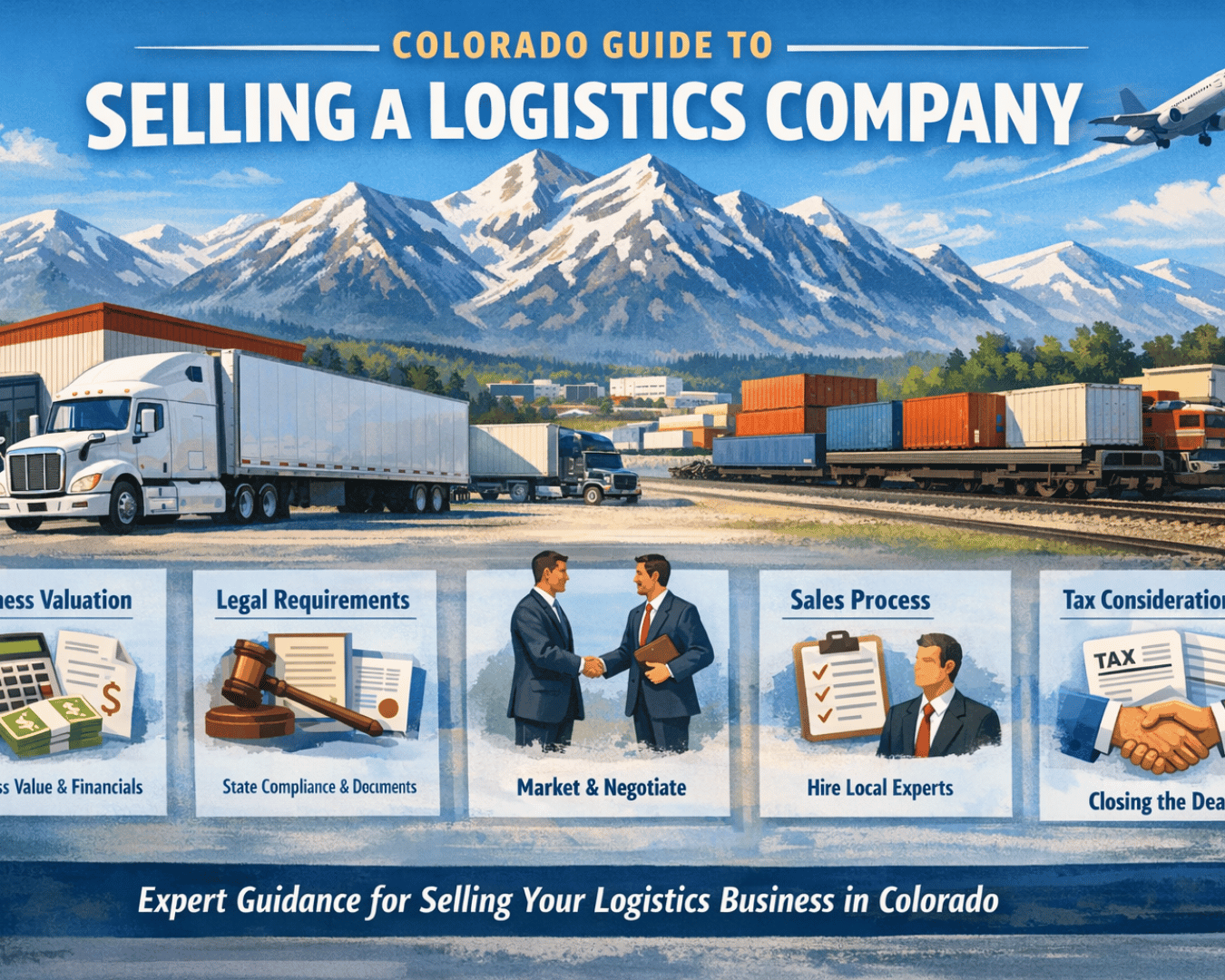













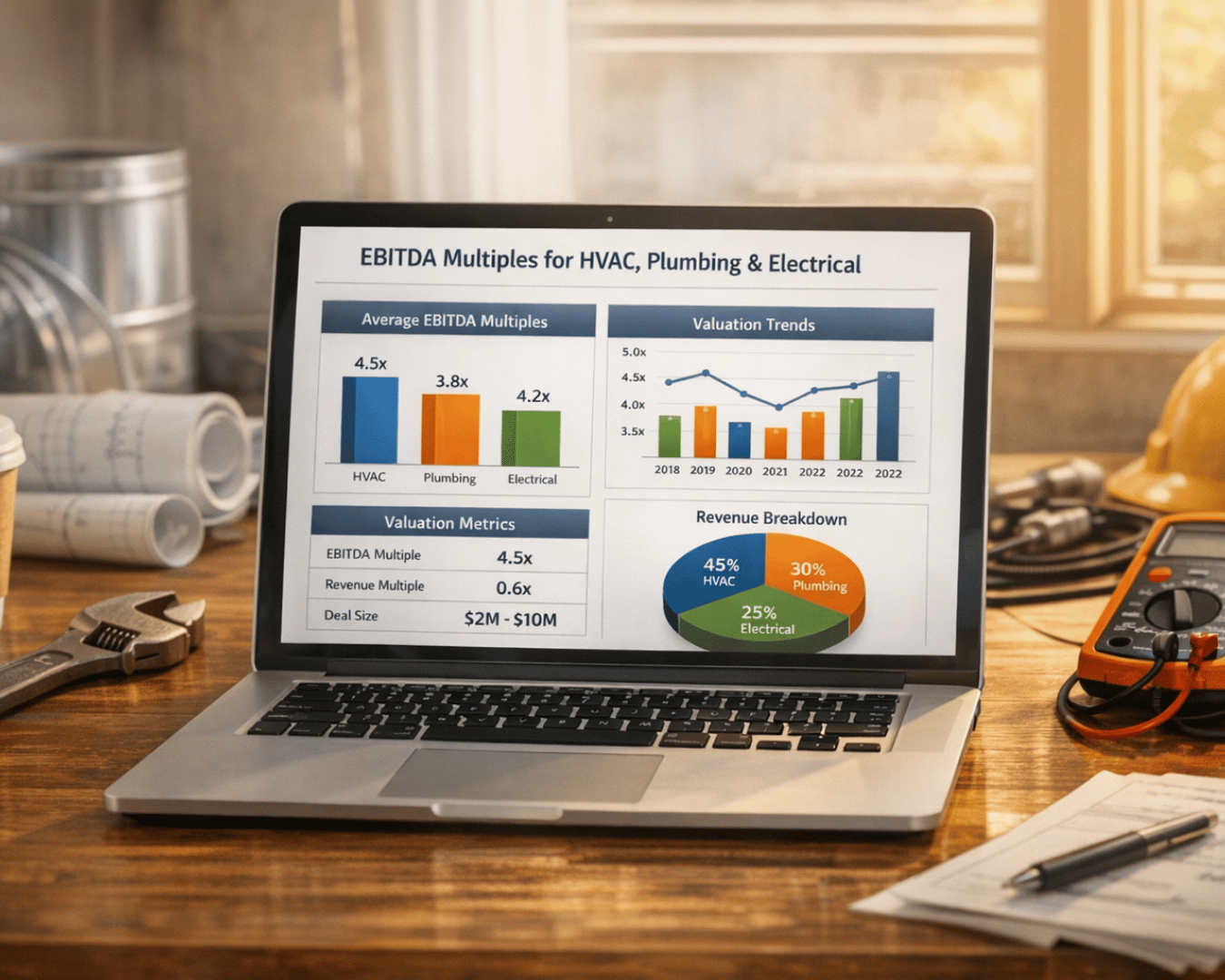
.png)


.png)
.png)

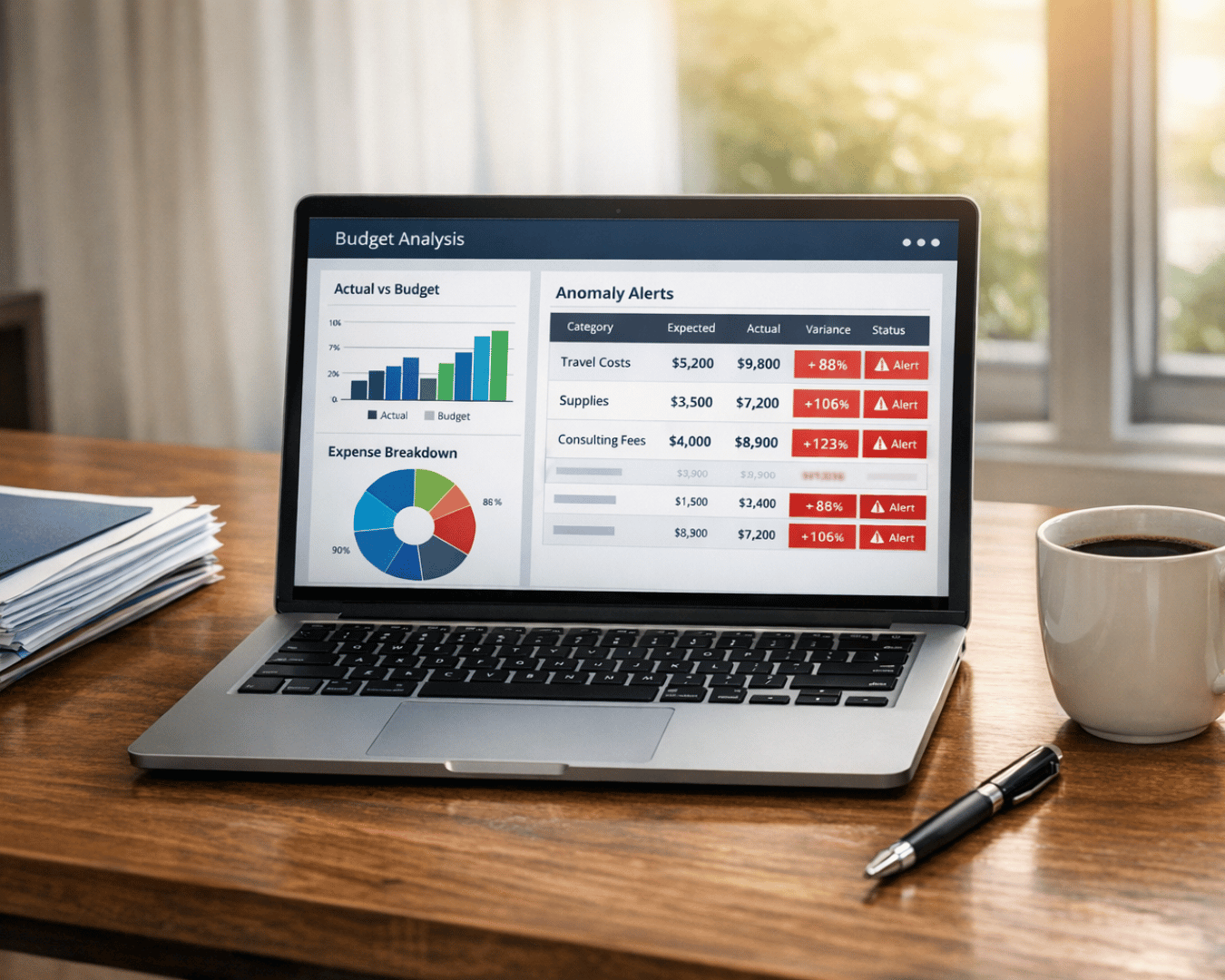











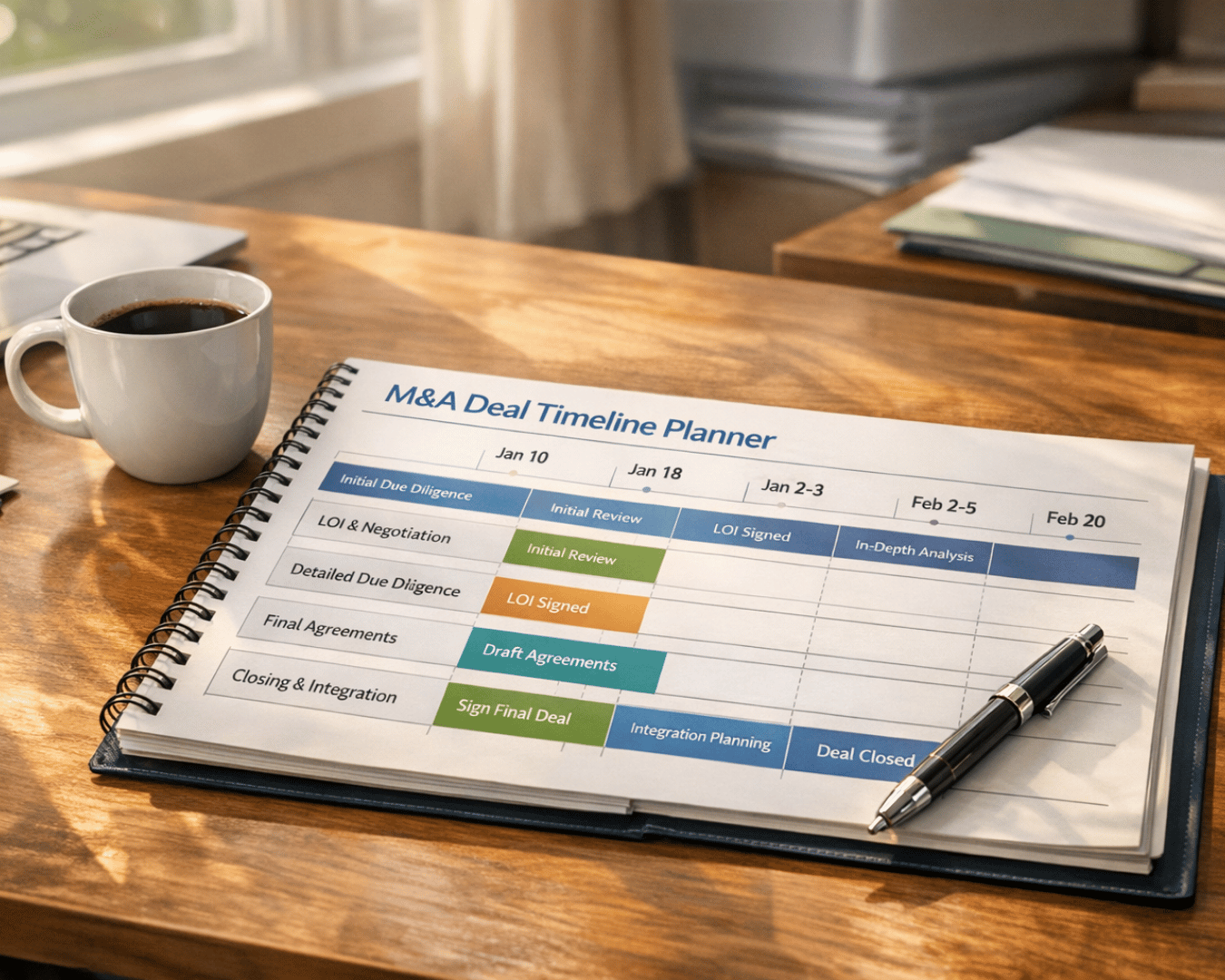











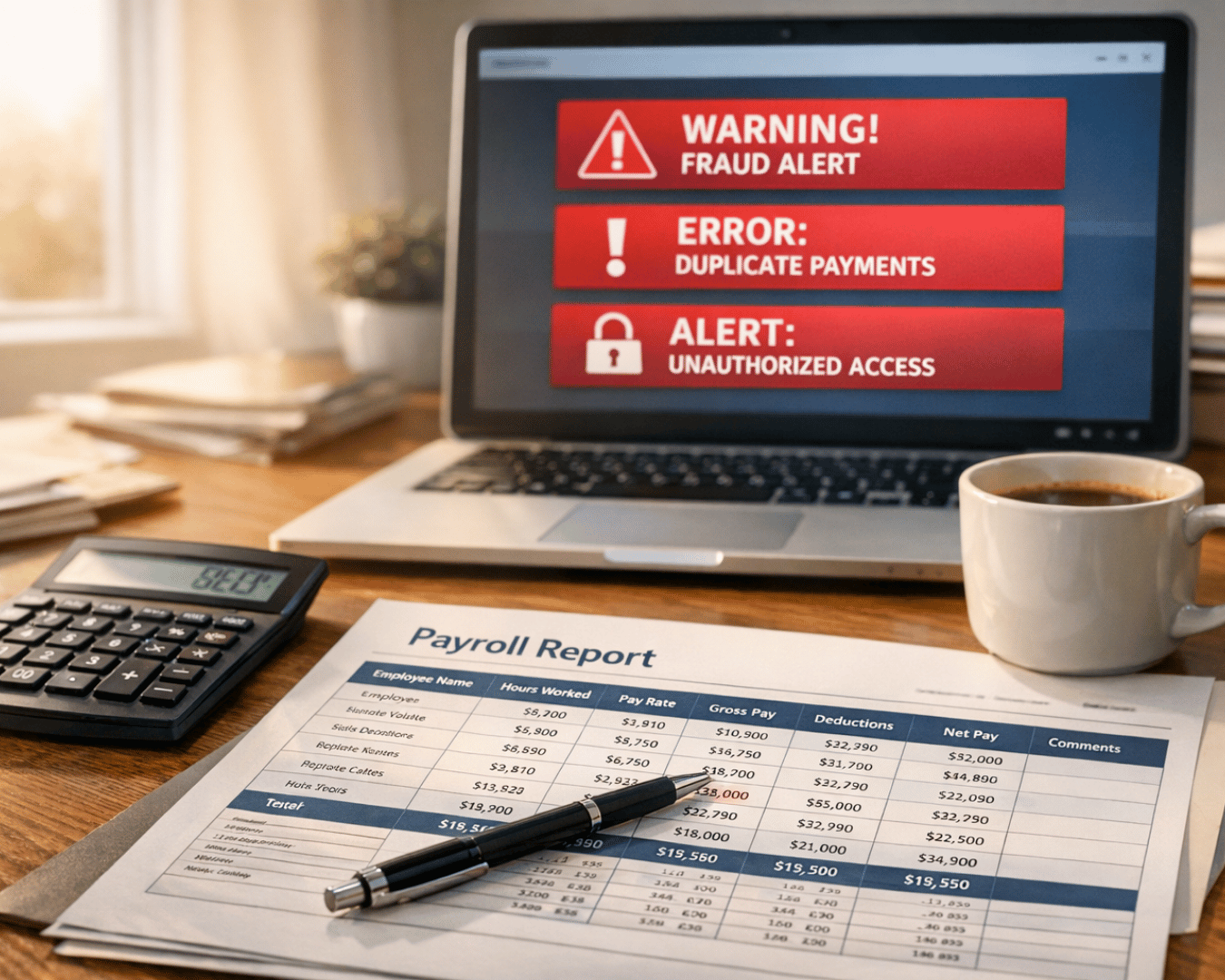








.png)
